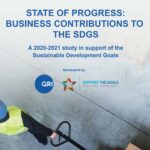
Almost two years on from the launch of the UN Sustainable Development Goals (SDGs), new research from PwC reveals that over three-in-five businesses now deem these to be important enough to include in their corporate reporting – a move that will help to significantly shift the dial in eradicating poverty and climate change.
The global SDG Reporting Challenge report shows that 83% of UK businesses and 62% of global firms surveyed are now reflecting SDGs at some level into their reporting.
Unanimously agreed by all the UN nations and launched in January 2016, SDGs were developed to help eradicate all forms of poverty, fight inequality and tackle climate change while ensuring no one is ‘left behind’. The PwC report analyses how almost 500 companies in 17 countries are reporting the action they are taking on the SDGs and seeks to discover which goals are being prioritised and how well businesses are reporting on them.
However, while it may appear at first glance that great strides in adoption have been made since January 2016, drilling into the data shows as many as two-in-five firms are still either ignoring or having no meaningful engagement with the goals.
This figure needs to shift if the ambition to effect real change by 2030 is to be achieved says Louise Scott, director in PwC’s Sustainability and Climate Change team and co-author of the report:
“It’s time for the businesses to stop paying lip service to SDGs and convert stakeholder and board aspiration into corporate action. Take SDG 13 ‘Climate Action,’ for example – a favourite goal for the majority of UK businesses.
“You might assume it’s one of the top rated priorities because of the high profile nature of climate change. But we think a more likely explanation is that most organisations already have mechanisms in place to measure greenhouse gases due to regulatory obligations, making it a relatively simple goal to respond to.
“But that’s not really looking in any depth at which SDG targets are most relevant to a business – either as a risk or as an opportunity. And that’s not really in the spirit of the SDGs either.”
All goals are equal, but some are more equal than others
The report stresses how vital it is for businesses to explicitly make the connection between the 17 goals and 169 targets. UK business may feel that by focusing on SDG 8 (Decent Work and Economic Growth) that they automatically contribute to SDG 1 (No Poverty) or 2 (Zero Hunger) for example.
But unless they can explicitly make this connection, they may find it difficult to report effectively and their stakeholders could struggle to make positive judgements on the strategy and purpose of their organisation.
Aligning strategy with SDGs could also help global businesses gain a much clearer view on how they help or hinder a government to achieve national goals – a move that could even strengthen their license to operate in those countries looking to create a SDG based society and economy.
This could give businesses a competitive advantage over competitors that don’t understand their contribution, enabling them to keep ahead of new policy interventions and use the knowledge to revise their strategies accordingly. It could also help them to put a financial value on the success of sustainable action both within the organisation and in larger society.
In short, a lack of clarity and connectivity could have a major impact on the ability of business to effectively report and could leave stakeholders struggling to make positive judgements on the strategy and purpose of their organisation.
Alan McGill, PwC UK sustainability reporting partner, says:
“Businesses need to better understand the interconnections between some of the SDGs. This could prove not only beneficial to their brand and bottom line but also their ability to expand and respond to more of the 169 targets than they may have thought possible.
“This insight requires a more robust and sophisticated level of reporting on the SDGs than currently exists.”
Is business aligned with citizens and government?
According to the results, it appears that in many cases, the priorities of citizens and businesses are misaligned – both in the UK and globally. This could pose an issue for those businesses wanting to strengthen their brand and reputation with consumers.
In the UK, for example, the top three business goals are SDG8 (decent work and economic growth), SDG 5 (gender equality), an issue the financial services sector has been addressing in recent years, and SDG 13 (climate action). The public focus, however, is on zero hunger (SDG 2), health and wellbeing (SDG3) and no poverty (SDG1). And according to our SDG Selector, the worst performing goals for the UK (and arguably those that should be government priorities) are SDG14 (life below water), SDG15 (life on land) and SDG4 (quality education).
According to the report authors, it’s all well and good for companies to prioritise those goals that are relevant to their business, but understanding and reflecting stakeholder engagement could be just as vital for any business aiming to build public trust.
As a result, companies need to start addressing bigger questions such as: where does our organisation fit into the world?; what and how does our business contribute to society?; and what negative impacts are inherent in how we currently do business?



